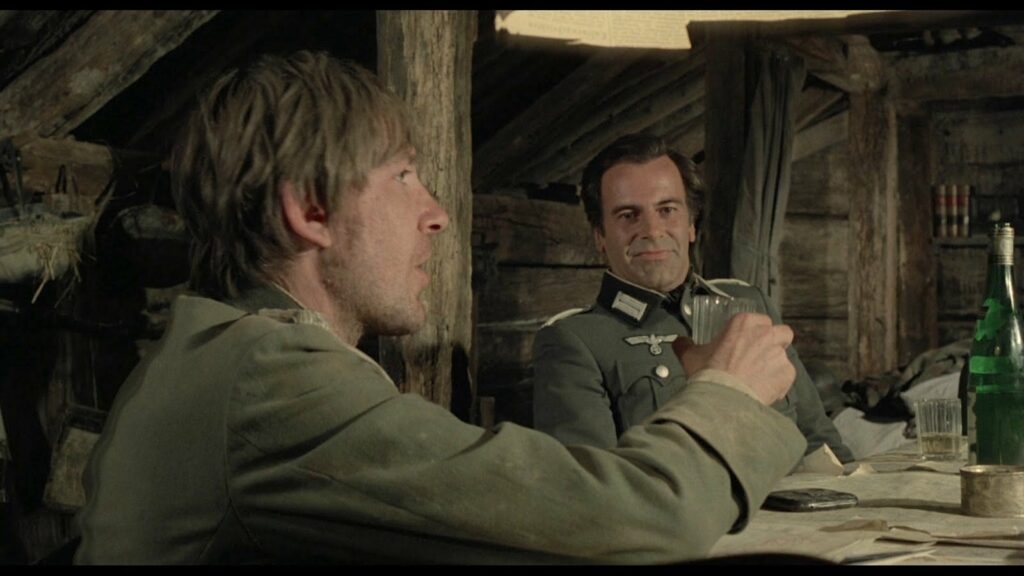Two types of nobility do battle in Sam Peckinpah’s Cross of Iron, a 1977 movie out of time in the Star Wars era and too subtle and ambiguous to count back then as mass entertainment.
Starting with the opening credits – German schoolchildren sing nursery rhymes one second, German soldiers bellow military anthems the next, while images of war and destruction flash up on the screen. Hitler takes a salute, there are pictures of men starving and dying on the front, and now we hear the children again. Is Peckinpah being ironic?
And then a shock. The Germans are the good guys. They are played by recognisable faces – James Coburn, James Mason and David Warner. Coburn the rough man’s man sergeant, Mason the superannuated and jaded colonel back behind the front, Warner the wise if worn out captain.
Normality reasserts itself a touch with the appearance of Maximilian Schell, a bona-fide German (Austrian, actually, but who’s arguing), as an aristocratic captain newly arrived at the front, where he’s determined to win the Iron Cross for bravery, even though, as anyone will tell him if he asks, the war is done, the Germans are losing and the folly of the whole sorry thing has now become clear for all to see.
Not to Captain Stransky (Schell), who’s on a one-man mission to “destroy the myth of Russian invincibility”, no matter how many men it costs.
Stransky, in case we hadn’t already worked it out, is the bad guy, and Peckinpah and his writers (including the brillianty witty Julius Epstein, of Casablanca fame – you can spot his lines) load him up with another signifier. He’s a homosexual, who early on makes a speech extolling a “world of men. A world without women…” who are “a nuisance”, hoping to flush out other soldiers who are like himself. He finds a willing fellow traveller in the shape of Lieutenant Triebig (Roger Fritz).
Stransky’s actual sexuality remains in question. What he says could be a powerplay – divide and rule etc. In any case the figure of Stransky seems to be there to give the writers the opportunity to get stuck into a broader concern about where a soldier’s loyalties should lie. Should it be, most crassly, with the man he’s sleeping with? Or with all his fellow soldiers? Does he dedicate himself to the current government? Or the country more generally? Where does a loyalty to humanity itself fit into all this? And what about that Cross of Iron?
Alongside this, related to it, the notion of nobility – titular nobility, as handed down as a matter of course to people like Stransky, or natural nobility, of the sort that Steiner has.
Though he’s too old at 60 to be playing a man at the front, James Coburn is convincingly authoritative, personable and limber as Sergeant Steiner, a soldier who already has an Iron Cross and the sort of man other men naturally look to as a leader. When injured Steiner gets the option to ride out the war in relative comfort at the hospital. There are women there! But back to the front he goes, to be with his men, though he has no illusions about Hitler or faith in his masterplan. Mason’s Colonel Brandt and Warner’s Captain Kiesel, meanwhile, act as a Greek chorus, pulling concerned faces at the progress of the war while making obvious that the German military at this point have lost all faith in Hitler as a strategist.a
The war is, in any case, a sideshow. The movie’s main struggle is not between Hitler and Stalin, but between a base patrician officer and a naturally noble underling – Old Europe versus New America, Aristocracy versus Democracy.
There is plenty of evidence of what was sometimes referred to as “medical materialism” (ie Peckinpah’s love of showing people being blown apart by bullets in slo-mo) but the really notable thing about Cross of Iron is how uninterested the director is in all this stuff. Sure, there are soldiers being bisected by rapid fire but the battle scenes in general are rote, old-school affairs, poorly choreographed and done almost with the impression of someone carrying out a contractual obligation.
Much more interesting is how Peckinpah and his team of four editors put together the small-scale guerrilla operations that Steiner and his crew undertake – genuinely gripping stuff – and more generally the way they montage the film together using the sound of warfare as punctuation for speeches. Man speaks – bomb explodes. He says something caustic – incoming zinger. He lands a killer point – heavy artillery whumps into the earth. It’s brilliantly rhythmic, playful, Kubrickian almost.
For all the elemental struggles of loyalty and competing notions of nobility it’s Cross of Iron’s editing and the rhythms of its film-making that constitute its claim to greatness. The movie as symphonic opus.
Cross of Iron – Watch it/buy it at Amazon
I am an Amazon affiliate
© Steve Morrissey 2023


